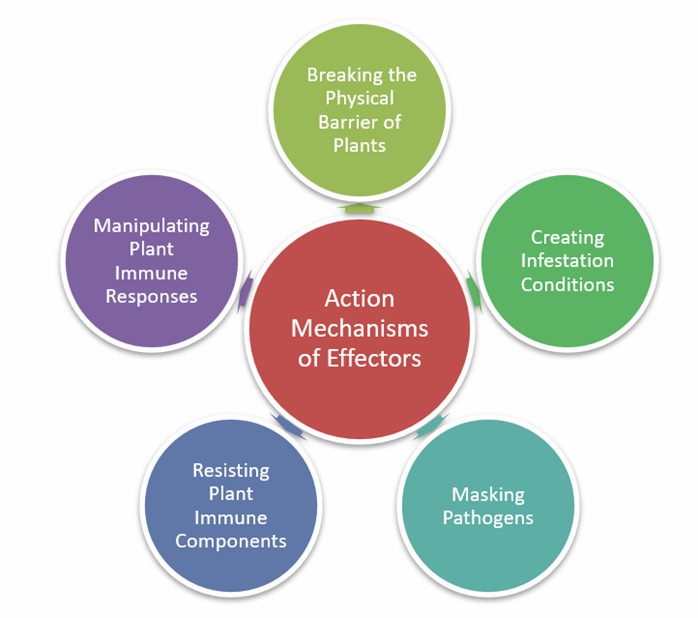Lifeasible contributes to effector research and offers services to help study the action mechanisms of effectors in plant-pathogen interactions. We help to unravel the action mechanisms of effectors in various ways.
Different types of pathogens produce effectors that have different effects on plants. Biotrophic pathogens primarily secrete effectors that suppress host immunity while minimizing damage to host cells for colonization of living plant cells or tissues. On the other hand, Necrotrophic pathogens mainly secrete effectors that induce necrosis in host cells for obtaining nutrients from dead plant cells. Hemibiotrophic pathogens selectively secrete effectors to promote infiltration during the biotrophic or necrotic phases of infection. Understanding the specific action mechanisms of these pathogen effectors can contribute to a deeper understanding of plant-pathogen interactions and the development of plant genetic breeding for disease resistance. Lifeasible contributes to the action mechanism research of effectors and offers a wide range of research services (Fig. 1).
 Fig. 1 Research on action mechanisms of effectors.
Fig. 1 Research on action mechanisms of effectors.
Lifeasible offers services to help study the action mechanisms of effectors. We help carry out mechanisms of action based on the possible modes of action mechanisms.
Breaking the physical barrier of plants
Breaking the physical plant barrier is an essential part of pathogen invasion. We help study the effectors’ effect on important physical defense-related structures in plants, including stomata, cell walls, plasmodesmata, callose, and the cytoskeleton. We can help detect the impact of effectors on stomatal opening and closing, analyze the degradation of cellulose, pectin, and cuticle on the plant cell wall, analyze the opening and closing of plasmodesmata, detect the accumulation of callose, and detect the interaction of effectors with actin or microtubulin in the cytoskeleton and the effect on cytoskeletal protein expression.
Creating infestation conditions
Pathogens secrete effectors to create suitable environments to promote infestation, and we help analyze situations where effectors change the environment to promote infiltration. Hydrophobic space favors the differentiation and penetration of appressorium, and we help analyze the hydrophobic conditions caused by effectors. Environmental pH is a key factor in the control of fungal pathogenesis. Some effectors cause alkalinization to promote infection, and we help detect effector-induced alkalinization response.
Masking pathogens
We help analyze the situation where pathogens evade plant immunity by masking pathogen-associated molecular patterns (PAMPs) or danger-associated molecular patterns (DAMPs) through effectors. In the case of chitin, which is a PAMP, we help to identify effectors that bind chitin or modify chitin to prevent the recognition of chitin by the plant immune system.
Resisting plant immune components
Plants produce immune components to resist pathogens. We help analyze the suppressed expression, degradation, and activity suppression of plant immune components caused by effectors. Take the example of chitin. We help to characterize sRNA effectors or effector proteins that inhibit the expression of plant chitinases, effector proteins that degrade plant chitinases, and peptide or small molecule effectors that compete with chitin to bind plant chitinases.
Manipulating plant immune responses
Some effectors can suppress plant immune signaling or interfere with plant immunity. We help detect the regulation of plant immune-related hormones (e.g., jasmonic acid (JA), salicylic acid (SA), ethylene (ET), and growth-related phytohormones), plant reactive oxygen species (ROS), and plant hypersensitivity response (HR) by effectors. And we also help explore the specific causes of these immune-related signaling alterations. Taking the regulation of ROS reduction as an example, we help to explore whether ROS reduction is based on the neutralization of ROS or inhibition of ROS production.
Other functions
Effectors have diverse effects on plants. Some effectors also promote infestation by interfering with plant physiological functions, such as interference with host vesicle transport and protein degradation. We can also help explore the effects and action mechanisms caused by these effectors.
Lifeasible provides you with the most professional effector research services. Please do not hesitate to contact us.
References